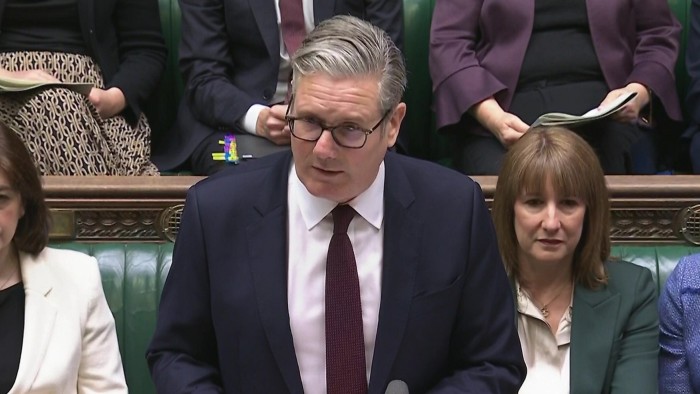Stay informed with free updates
Simply sign up to the UK tax myFT Digest — delivered directly to your inbox.
Sir Keir Starmer has refused to rule out prolonging a freeze on income tax thresholds for the rest of this parliament, as the UK Labour government battles to fill a fiscal hole some economists say could be more than £20bn.
Starmer told MPs at Prime Minister’s Questions on Wednesday that he stood by the Labour party’s manifesto commitment not to raise income tax, national insurance or VAT on working people.
However, he refused to be drawn on whether extending the freeze on tax bands was under consideration.
Chancellor Rachel Reeves has previously said that prolonging the freeze, which the former Conservative government extended to April 2028, would “hurt working people”.
Reeves is racing to find ways to fill a growing hole in the government’s finances after a series of expensive U-turns by Starmer on welfare reforms following a rebellion by Labour MPs. The chancellor’s predicament has been made worse by lacklustre economic growth.
Analysts estimate the fiscal hole could be £20bn to £30bn by the autumn, with Starmer on Wednesday promising to stick to the government’s self-imposed fiscal rules.
Extending the freeze on tax bands beyond April 2028 would raise £9bn to £10bn through fiscal drag by the end of the parliament, according to the Institute for Fiscal Studies think-tank.
By not increasing tax bands in line with inflation, more people end up paying higher marginal rates, such as the 40 per cent level that kicks in on earnings above £50,271 or the 45 per cent rate above £125,140.
Lower earners may also be brought into taxation.
The freeze policy is already expected to bring 4.2mn extra taxpayers into income tax — and shift 3.5mn taxpayers into the higher rate band — by 2028-29. Another 600,000 will move into the 45p additional rate band.
Starmer said he “would stick to our manifesto commitments and stick to our fiscal rules”, without ruling out the freeze.
Reeves said at the last Budget that continuing the freeze would “hurt working people”. Some commentators believed she was implying that such a move would be equivalent to breaking Labour’s manifesto pledge not to increase taxes on workers.
But, having ruled out changes to the taxes that account for most of the government’s revenues, Reeves has limited options, and the party leadership has struggled to win MPs’ backing for any reduction in spending, despite Labour’s large majority.
Forecasts by the Office for Budget Responsibility suggest the existing freeze will raise £48.9bn, or 1.4 per cent of GDP, by 2029-30.
The IFS forecasts that 14 per cent of adults will be paying the marginal 40 per cent rate of tax by 2028 compared with less than 4 per cent caught in that band in the early 1990s.
By contrast, in 2028, about 3 per cent of UK adults will be paying a marginal rate of 45 to 60 per cent.



